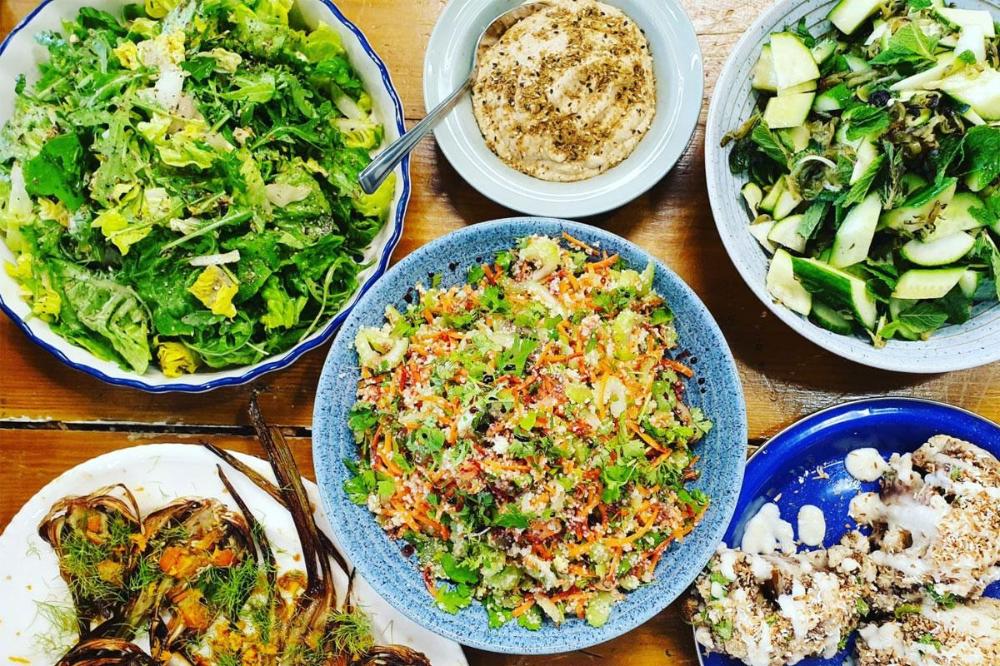In the 1950s we spent a third of our income on food shopping – and by 2016 it was 10%. [Which?]
.
There are a lot of ‘food facts’ out there which challenge our perceptions of how and what we eat – and how much it really costs. And it’s all very much in the news.
GLEANING FOOD, NOT WASTING FOOD
A Food on Film autumn season starts in Exeter this evening:
The programme exploring our relationship with food continues with documentary and narrative film screenings and a visit to Exeter Growers Co-operative. The Food on Film programme continues in October with documentary and narrative film screenings and a visit to Exeter Growers Co-operative.
On Tuesday 10 October there will be a screening of The Gleaners and I, an Agnès Varda documentary about “gleaning” in rural and urban France. Gleaning historically referred to the act of collecting crops left over after harvest but has expanded to include the collection of food from supermarkets that would otherwise be thrown away.
This will be followed by a screening of Wasted! The Story of Food Waste on Tuesday 17 October. This documentary explores the ways in which professional cooks reduce waste to make the most of the food they buy. It features well-known chefs including the late Anthony Bourdain.
At the other end of the scale are the ultra-processed foods – and last week, ITV’s Tonight asked: Ultra Processed Food: What Are We Eating?
So called ‘ultra processed food’ is often quick, cheap and easy to access – but is it expanding our waistlines and making us ill? Should we be looking more closely at the industrial processes used to produce it, and the chemicals it contains? Is it always something to avoid? And most importantly is what we’re eating doing us harm? Kate Quilton has been finding out.
“I wouldn’t call it food […] these are manufactured edible food-like items that have contents that you wouldn’t find in your home kitchen. They’re basically, stripping away all the things from the whole food then adding in a whole range of chemicals to stick them together. And this we are now realising is a major problem for our health.”

HOW EXPENSIVE IS FOOD REALLY?
The problem is that UPFs are cheap – and yet that is a false saving if we look at the true costs of processed foods on our health, our planet.
And yet, food is more expensive in the UK than a couple of years ago for a variety of reasons; food banks are even more in demand; and food poverty and fair access to food even in Devon continue to be serious issues.
With a look from the BBC in May as to why food bills aren’t shrinking:
Food prices are 19% higher than a year ago. A grocery shop that used to cost £50 is now nearer £60. That prompted the prime minister to hold a food summit at Downing Street, but it is still not entirely clear where the solution lies. Last year the war in Ukraine pushed up the price of food and energy, but recently those prices have fallen sharply, so why haven’t bills? Here are five things that help explain what’s happening…
On the other hand, food is less expensive in the UK than in many other major economies.
Here the BBC looks how UK prices compare to five EU countries:
Loo roll, butter and ketchup are more expensive in the UK compared to some of our biggest European neighbours, research for the BBC suggests. But the UK is the cheapest for nappies and frozen pizza, consumer analysts Circana found. We compared the prices of 23 food and non-food items in France, Germany, the UK, Italy, Spain and the Netherlands. When we added up the cost of buying them all, Germany came out as the cheapest and France the most expensive.
And here the Mail reports today on an American living in England, stunned by ‘cheap’ groceries at Tesco – and who says she’s in ‘heaven’ over ‘high quality food’ and meat ‘without a tonne of chemicals’
An American woman living in the UK has shared her surprise at the ‘cheap’ and ‘high quality’ groceries available in Tesco. Mrs Haas, who moved from Alaska to the UK with her 11-year-old daughter to study for a PhD at Warwick University shared a video of her amazement while wandering through the aisles. In a video shared to TikTok, the mother-of-two said: “One of the biggest moments I’ve been waiting for – getting to shop at an English grocery store and seeing the difference in the food, it’s everything I dreamt of.”
This reflects a study from earlier in the year comparing the cost of living between the UK and the US:
It’s estimated that a British household spends £280-£300 per month for two adults, rising to £370 for a family, while an American household will spend almost $700 on groceries, which is up to 2.5 times more than you might expect to pay in the UK..
A final comment from a contributor:
This is more ‘proof’ that most UK people could eat well if they prioritised it, our food is so cheap compared with when I was a kid.
And indeed, looking at how food prices compare to 30 years ago, you might be surprised says Which?
New Which? research shows that in the UK we actually spend less on food than previous generations did, and many popular foods are cheaper now than they were 30 years ago. In the 1950s we spent a third of our income on food shopping, but in 1974 this had gone down to 24%. By 2016 food shopping accounted for just 10.5% of our income. Use our supermarket price comparison to get the best deal on your shopping.
…